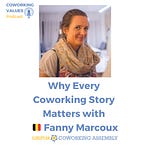"For someone who's been in the industry for eight years, I get tired of telling people what coworking is. I want people just to know and understand."
Sam Shea discovered coworking the way most brilliant ideas are found — by accident, whilst dreaming up something else entirely.
As a kid obsessed with entrepreneurship (selling bookmarks to neighbours, attempting to rebrand rocks), she'd imagined something called "the Living Space" — a place where people could gather, work, and share meals outside their homes.
When the internet finally let her research this concept properly around 2010, she made the deflating discovery that every entrepreneur eventually makes: someone had beaten her to it.
But rather than disappointment, this led to fascination.
Here was proof that her instincts were sound; this hunger for a community workspace was universal enough to spawn an entire movement.
The problem? Her small town outside Charlotte had no coworking spaces. The nearest was WeWork in New York City — miles away from where real people like her lived.
Fast-forward to 2025, and Sam sits at the intersection of that same tension.
Through her role at Liquid Space and as founder of Future Leaders of Coworking, she witnesses the full spectrum of the industry daily — from neighbourhood spaces like Alkaloid Networks in Atlanta (where she's a member) to enterprise-scale operations.
Sam is watching thousands of career-hungry professionals enter an industry that still can't properly define itself to the outside world.
The evidence is maddening: London alone has 1,300 coworking spaces, yet when you set up your LinkedIn profile, you're forced to choose between "real estate," "management consulting," or "hospitality."
It's like being vegetarian in a restaurant that only serves chicken or beef.
Sam and her team at Future Leaders have launched a Change.org petition demanding LinkedIn recognise coworking as its own industry category — because you can't build careers in a sector that doesn't officially exist.
Timeline Highlights
[01:11] "I'm known for aggregator strategy, community building. I'm known for being a connector. I would say I would like to be known for being a little bit visionary."
[03:06] "There were times where I needed to get away from home, whether I was an angsty teenager and I just wanted to break free from my parents."
[05:06] "I had dreamed up a concept called the Living Space... I thought, Why isn't this in my town? That would be amazing."
[08:36] "I basically didn't have any friends in Boston. I was seeking connection, and I thought, No one's going to invite me out, I might as well invite others."
[16:25] "You don't have to code-switch into a different corporate being. When you show up there, you can come as you are."
[19:08] "It's like improv. You're quick on your feet when you're in a community management role."
[23:24] "I personally did it for three years, and that was plenty of time for me to understand it. But I also miss that community management role all the time."
[25:30] "I noticed that there were no organisations devoted to future leader success across the coworking world."
[28:08] "I've often thought, Sam, if only you could go to LinkedIn and when you choose your industry, there was a drop-down menu and you could click coworking, what do you think that would do?"
[29:04] "That is something that Future Leaders of Coworking has started. We did do a change.org petition."
[31:29] "You can find Future Leaders of coworking at futureleadersofcoworking.com."
The Community Manager Career Paradox
There's something beautifully broken about how people stumble into coworking careers.
Unlike hospitality — where you start as a bartender, become shift leader, then restaurant manager in a predictable progression — coworking careers feel like career improv.
Sam spent three years as a community manager and describes it as the ultimate generalist training: "It's managing the P&L of the space, so overseeing the finances and making sure that you're on par for KPIs. It covered so many different things."
The role demands everything at once. You're an event planner, operations coordinator, salesperson, financial analyst, therapist, and social connector.
As Sam puts it: "There are very few jobs in which you spend that many hours a day with your end-user customer." The intimacy is real — she's still close friends with members from spaces she managed years ago.
But here's the career confusion: what comes next? Sam met people who've done community management for one year, others for ten years.
The path isn't clear because the industry itself is still writing its own job descriptions.
If you work for a single location with no scaling ambitions, you might have access to fewer than five total roles.
If you're willing to move between brands, you can craft a career around marketing, operations, or member experience — but you're essentially building the bridge as you walk across it.
The promise of Future Leaders of Coworking is to make these paths visible.
Not to create one rigid ladder, but to help people see the multiple directions possible within an industry that's diverse enough to support everything from neighbourhood third places to enterprise workspace solutions.
The Third Place That Saved an Angsty Teenager
Sam's relationship with third places started with necessity, not theory.
Growing up in Davidson, North Carolina, her options were limited: the coffee shop, the library, or CVS Pharmacy. "If I was not at the coffee shop or the library, I was at the CVS Pharmacy Store. That's where I would hang out and gather with my friends."
These weren't Instagram-worthy spaces or designed community hubs. They were refuges — places where an angsty teenager could escape family dynamics without paying an entry fee.
The library became her sanctuary, offering both solitude for projects and the possibility of unexpected encounters.
This early hunger for places that weren't home or work explains her adult obsession with bringing people together.
She describes herself as someone who "could never sit with myself" — always throwing herself into clubs, starting a babysitter's club, a dog walker's club, anything to create connection points for people who might be too shy to make those bridges themselves.
The pattern continued in Boston post-graduation, where loneliness drove her to start the Boston Ladies Brunch Club on Meetup.com. "No one's going to invite me out; I might as well invite others."
The group grew to hundreds because she'd identified something universal: the need for structured social connection in a new city.
What's fascinating is how this personal need for gathering spaces evolved into professional expertise in creating them.
Sam's instinct for reading room dynamics — knowing who to call on first during icebreakers, identifying natural advocates — comes from years of being the person desperate enough to organise the thing that didn't exist.
The Spectrum Problem: From Neighbourhood Gems to Corporate Chains
Sam occupies a unique vantage point in the coworking universe.
Through Liquid Space, she "gets to interact daily with different spaces, everyone from the indie workspace up to the larger global chains." It's like being a translator between different species within the same ecosystem.
Her heart lives in neighbourhood spaces like Alkaloid Networks, where she's been a member for three years.
These are the spaces that echo her original "Living Space" vision — places where "you can come feel like yourself. You don't have to code-switch into a different corporate being."
But her professional eye recognises the value across the entire spectrum: "Whether you're going to meet a friend as a remote worker, or if you're going to meet up with your enterprise team and you need a larger suite accommodation, I think that there's room for all different kinds of third spaces to thrive."
The challenge isn't choosing sides — it's helping the world understand that coworking encompasses all of it.
The corporate real estate sector is finally catching up to what coworking pioneers knew years ago: "Flexibility and workplace choice is the future."
However, in the rush to adopt "flex workspace," the essential community DNA of coworking risks being diluted.
This is why LinkedIn recognition matters so much. When coworking gets lumped into "real estate" or "hospitality," it obscures what makes it fundamentally different.
Sam argues: "The faster that we can make sure that the world knows that coworking is not necessarily commercial real estate, I think everyone will be in a better position."
The Isolation of Working in Community
Here's the irony that drives Sam's mission: coworking professionals spend their days creating connections for others whilst remaining professionally isolated themselves.
"I found that a lot of people in our industry are siloed. If they come into coworking, they're only familiar with the one brand that they work for, and they're not necessarily getting exposure to the global world of coworking."
This isolation hinders both individual careers and industry development. A community manager in Birmingham might face the same challenges as someone in
Barcelona, but they'll never discover this without deliberate connection efforts.
Meanwhile, industry conferences attract mostly owners, executives, and vendors — leaving the front-line professionals who deliver the daily magic largely invisible.
Future Leaders of Coworking addresses this through peer-to-peer connection, mentorship matching, and quarterly workshops focused on career growth.
But the deeper goal is cultural: "How do we get everyone, not just the owners and the executives, super passionate and excited to share that knowledge and expertise with the world... I think that starts from the bottom."
The vision is powerful: thousands of community managers and mid-career professionals becoming vocal advocates for the industry, sharing expertise, celebrating victories, and making coworking's value proposition impossible to ignore.
When the people doing the work become the people telling the story, everything changes.
The Numbers That Could Change Everything
Bernie poses the crucial question: What would happen if LinkedIn added coworking to its industry dropdown?
Sam's response captures the frustration of working in a shadow economy: "There are so many amazing coworking professionals around the world that are actively posting on LinkedIn. Unless you know where to go, you won't know where to find one another."
The petition exists, launched by Sam's team at Change.org.
London alone has 1,300 coworking spaces.
The LinkedIn Coworking group reaches 650+ people weekly. The infrastructure for viral success is in place — it just needs to be activated.
But this isn't really about LinkedIn recognition. It's about legitimacy, career visibility, and industry coherence.
When someone selects "coworking" as their professional category, they're not just updating their profile — they're claiming membership in a movement that's reshaping how humans relate to work and their surroundings.
The petition represents something larger: the industry's transition from scrappy startup phase to mature professional sector.
A sector where brilliant, community-obsessed people like Sam can build careers without constantly explaining what they do for a living.
Links & Resources
Sam Shea's Work
Follow Future Leaders of Coworking on LinkedIn and Instagram
Board Members: Dashon Brown, Caroline Van Denijn, Annie Olson, Blaise Randall
Projects & Community
One More Thing
Coworking brings communities together, helping people find and share their voices.
Each episode of the Coworking Values Podcast explores Accessibility, Community, Openness, Collaboration, and Sustainability—values that shape the spaces where we gather, work, and grow.
If this resonates with you, rate, follow, and share the podcast. Your support helps others discover how coworking enriches lives, builds careers, and strengthens communities.
Community is the key 🔑











